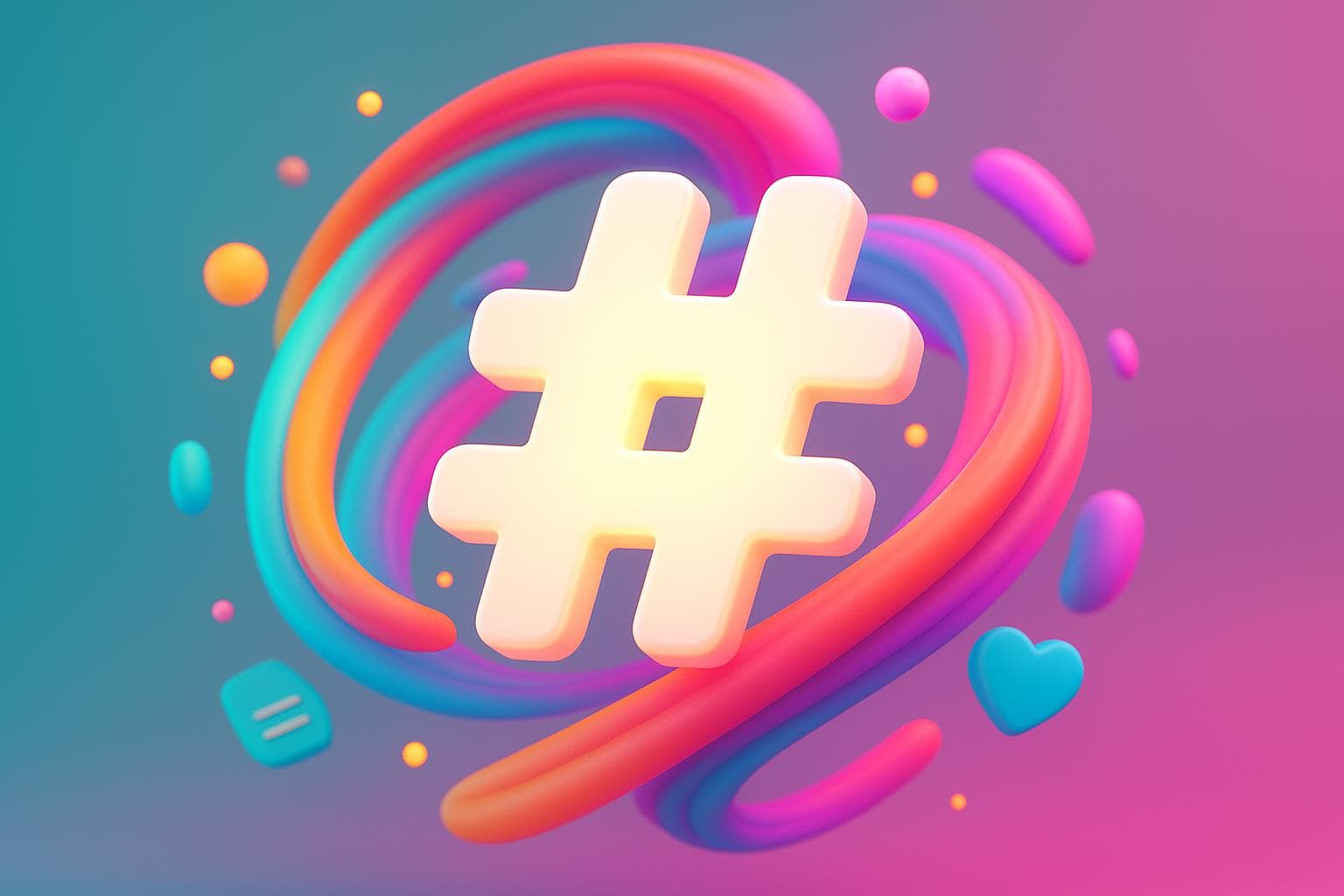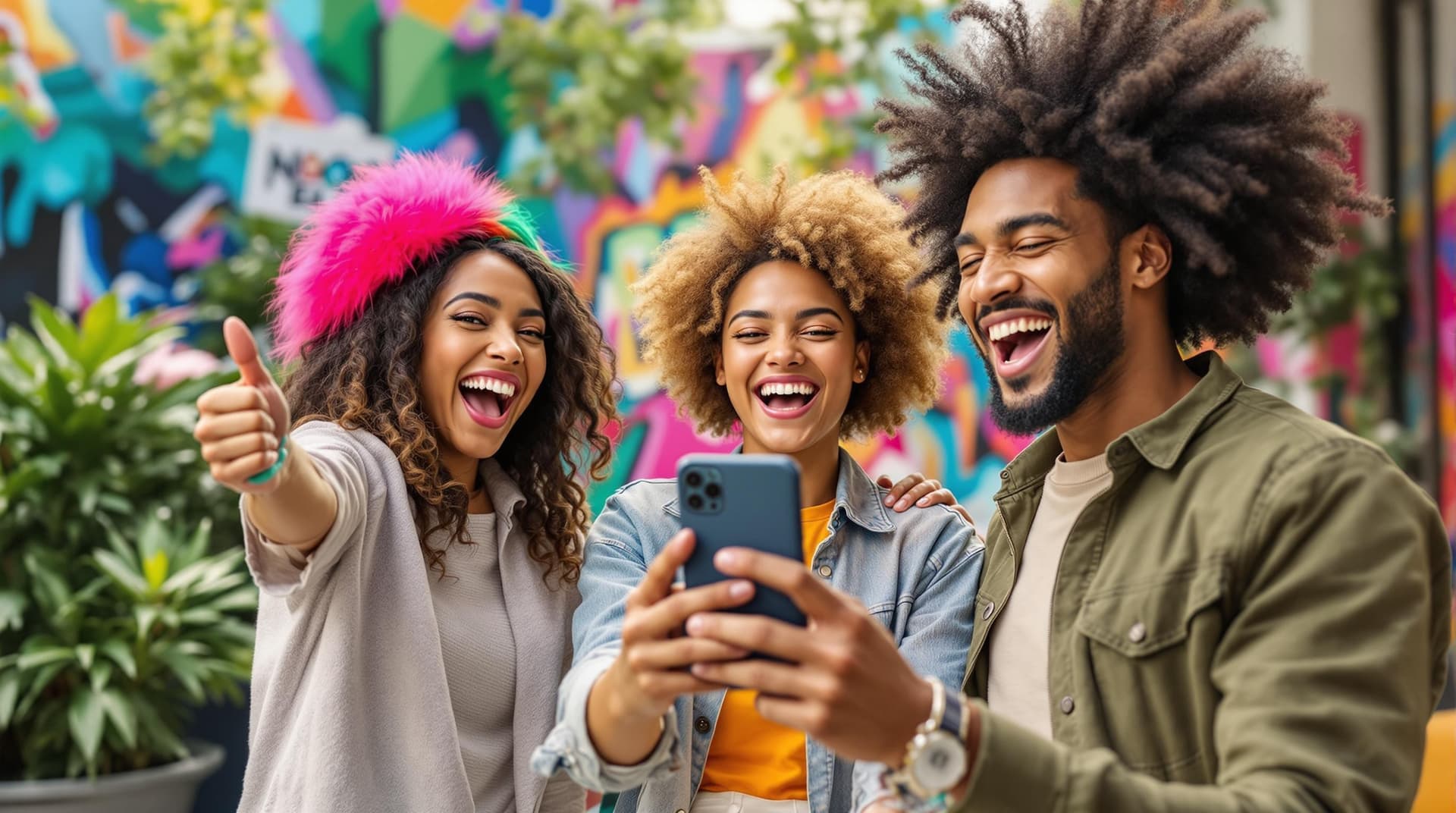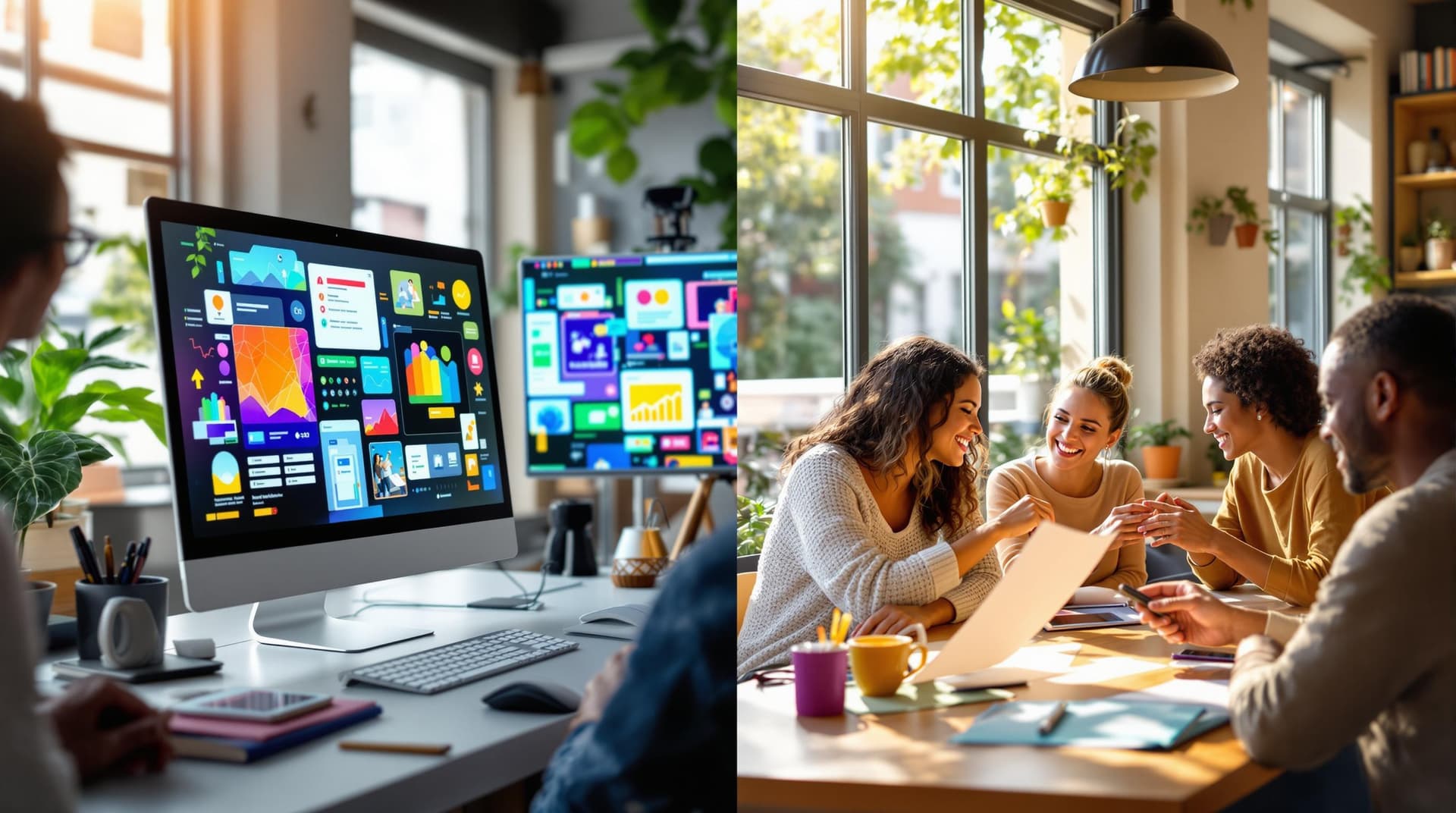
Facebook’s algorithm in 2025 has transformed how hashtags impact content reach and engagement. Here’s what you need to know:
- Hashtag Use Matters: Posts with 2-5 hashtags perform better, increasing reach by 43%. Overusing hashtags (more than 7) can cause a 27% drop in reach.
- Relevance is Key: Hashtags aligned with content and audience interests drive higher engagement. Niche and branded hashtags outperform generic ones.
- Engagement Boost: Hashtags that prompt interaction (like questions) improve visibility by activating Facebook’s engagement-focused ranking system.
- AI Tools Lead the Way: AI-driven platforms, like MagicUGC, analyze data to suggest effective hashtags, saving time and improving campaign performance by up to 15%.
Focus on using fewer, well-chosen hashtags that resonate with your audience. Pair them with engaging content and leverage AI tools to stay ahead of algorithm changes.
Facebook Hashtags (How To Actually Use Them To Increase Views)
How Facebook's Algorithm Processes Hashtags
Facebook's algorithm takes a step-by-step approach to evaluate and rank posts that include hashtags. This process sheds light on how hashtags influence a post's reach and engagement.
Facebook's Ranking Process
The ranking starts with Facebook grouping potential posts, using hashtags to sort content by topic, location, or theme.
Next, the algorithm analyzes signals such as past user interactions and engagement, with hashtags helping to clarify a post's relevance. Predictive models then come into play, estimating the likelihood of engagement based on user behavior and the popularity of similar content.
Finally, each post is assigned a relevance score. Posts that align well with user interests and drive engagement are given a visibility boost. This method highlights how hashtags can act as key signals in Facebook’s ecosystem, enhancing content performance.
Hashtags as Ranking Signals
Hashtags not only organize content but also increase its discoverability by making posts searchable and visible to users exploring or following specific tags. Facebook's algorithm evaluates hashtags based on three main factors: relevance, popularity, and location-specificity.
- Relevance: The algorithm assesses how closely a hashtag matches a post's content. For instance, when a local restaurant uses #StatenIslandFood to promote dining options, the hashtag clearly signals content relevant to users interested in local cuisine.
- Popularity: While widely-used hashtags attract more posts, Facebook prioritizes those that foster meaningful interactions within niche communities. Research involving over 200,000 brand posts showed that posts with one or two hashtags averaged 593 interactions, compared to 416 for posts with three to five hashtags and just 188 for posts using 10 or more hashtags.
- Location-Specificity: Seasonal hashtags like #BackToSchoolDeals in August or #HolidayGifts in December gain traction when users actively search for related content.
Facebook also rewards posts that generate high engagement, creating a cycle where effective hashtag use leads to more interactions, which further boosts visibility. Consistency in hashtag usage across Meta platforms - like Facebook and Instagram - helps brands establish clarity in their content themes and reach their target audiences more effectively.
Research Findings on Hashtag Performance
Recent studies analyzing millions of posts have shown that using hashtags strategically can significantly enhance content performance on Facebook. Below, we’ll dive into the best practices for hashtag usage and explore the types of hashtags that drive the most engagement.
Best Hashtag Usage and Strategies
An analysis of over 200,000 brand posts reveals a fascinating trend: posts with just one or two hashtags generate an average of 593 interactions, while those with 10 or more hashtags see that number drop to 188. That’s an 8.4% boost in engagement for minimal hashtag use, compared to a 17% drop when using five or more tags. The takeaway? Less is often more when it comes to Facebook hashtags.
This data reflects Facebook’s emphasis on authentic, engagement-driven content. The secret isn’t in the number of hashtags but in their relevance and specificity. Niche hashtags outperform generic ones because they connect with highly engaged, targeted audiences. Interestingly, whether you place hashtags in the caption or the comments section doesn’t affect how the algorithm treats them.
Facebook’s hashtag suggestion tool has also become more advanced, offering recommendations based on post content, trending topics, and user behavior. Combining these algorithmic suggestions with your own branded hashtags can help maximize engagement.
By focusing on relevance and thoughtful selection, brands can fine-tune their hashtag strategies to effectively reach their desired audiences.
Top Performing Hashtags for Brands and Creators
The most successful Facebook hashtag strategies often incorporate a mix of branded hashtags, niche-specific tags, and timely or trending hashtags. Each plays a unique role in helping your content stand out.
- Branded hashtags: These build community and reinforce brand identity. They also ensure consistent messaging across campaigns.
- Niche-specific hashtags: These are ideal for targeting specific audiences or interests. For example, a local business using #StatenIslandFood will likely see more engagement from nearby customers than with a broad hashtag like #food.
- Event and seasonal hashtags: These tap into trending topics and cultural moments. A great example is KFC’s use of #NationalFriedChickenDay, which capitalized on a food holiday to boost visibility.
A great case study is Coca-Cola’s #ShareACoke campaign. By encouraging user participation and content sharing across platforms, the campaign achieved a 33% average revenue increase.
Additionally, hashtags supporting social causes and community movements are gaining traction on Facebook. Brands that authentically align with relevant causes often see higher engagement and loyalty, especially among younger audiences.
Ultimately, the research highlights one key principle: authenticity trumps quantity. Posts that seamlessly integrate hashtags into natural, conversational content tend to perform better than those overloaded with tags. This approach aligns with Facebook’s algorithmic preference for content that fosters genuine interactions and meaningful conversations.
sbb-itb-d822133
Using AI for Hashtag Optimization
The way brands approach hashtag optimization has dramatically shifted thanks to artificial intelligence. Gone are the days of spending hours researching and guessing which hashtags might work. Instead, AI-powered tools are reshaping how marketers navigate Facebook's intricate algorithm. With 91% of top brands incorporating AI into their marketing strategies, it's clear that automated hashtag optimization is becoming a must-have for staying competitive.
AI tools excel at analyzing massive datasets in real time, uncovering hashtag trends and patterns that would be nearly impossible for humans to identify manually. Considering that Facebook's Feed ranking relies on over 100 prediction models, AI's advanced processing capabilities make it uniquely suited to tackle this complexity.
AI in Hashtag Selection and Campaign Optimization
AI's role extends beyond just analyzing data - it’s now seamlessly integrated into the content creation process. These platforms process millions of data points almost instantly, identifying trends and suggesting hashtags that align with Facebook's algorithm. They consider factors like user behavior, engagement metrics, and trending topics to recommend hashtags that maximize visibility and performance.
Take MagicUGC, for example. This platform incorporates hashtag optimization directly into its content creation workflows. Trained on over 1 million high-performing social media videos and ads, its AI models automatically generate hashtag suggestions that complement its viral script creation tools. When MagicUGC produces user-generated content videos, it simultaneously selects hashtags based on proven campaign performance data. This kind of integration highlights how AI is reshaping Facebook marketing strategies.
MagicUGC also goes a step further with its AI Persona Targeting feature, which tailors hashtag strategies to specific demographic groups. By pinpointing hashtags that resonate with particular audiences, it ensures campaigns are more targeted and effective.
The results speak for themselves. Research shows that businesses using AI-driven hashtag optimization see a 15% boost in campaign performance compared to traditional methods. This success is largely due to AI's ability to quickly process engagement data and adapt strategies in real time - something manual approaches simply can't match.
Why AI Outperforms Manual Hashtag Strategies
The advantages of AI-driven optimization are clear. For starters, AI-powered personalization can increase revenue by up to 15% through precise audience targeting and more relevant content. These platforms also improve workflow efficiency by 40%, freeing up marketing teams to focus on strategy rather than repetitive tasks.
Scalability is another key benefit. For brands managing multiple campaigns, AI can optimize hashtags across hundreds of posts while tailoring them to different audience segments. In contrast, manual methods often result in generic, catch-all strategies that lack the nuance needed for effective targeting.
AI's ability to adapt in real time is a game-changer. As Facebook's algorithm evolves and trending topics shift, AI systems automatically update hashtag recommendations to keep content optimized. They also analyze user behavior, ideal posting times, and hashtag combinations, which can improve conversion rates by up to 30% compared to traditional methods.
For marketers, embracing AI-driven hashtag optimization isn’t just an option - it’s becoming a necessity. As Chris Marine, founder and CEO of Campfire Consulting, puts it:
"In 2025, we anticipate an even stronger focus on AI-curated content and hyper-personalized user experiences. As Facebook leans into more advanced AI-driven recommendations, brands should prepare for increased competition in delivering highly relevant, audience-specific content."
This insight highlights the growing importance of leveraging AI tools to meet the demands of Facebook's ever-evolving algorithm and deliver the personalized experiences that audiences now expect.
Manual vs. AI-Driven Hashtag Strategies
Deciding between manual and AI-driven hashtag strategies is a key choice for today’s marketers. While traditional methods have been the norm for years, the growing complexity of Facebook's algorithm has widened the performance gap, making AI-driven approaches increasingly appealing.
Manual hashtag research often involves tedious tasks like scrolling through posts, maintaining spreadsheets, and making educated guesses. This approach relies heavily on assumptions, often leading to generic hashtags that don’t perform well. The result? Inconsistent outcomes that can hinder a campaign's success.
On the other hand, AI-driven hashtag tools analyze millions of social media posts in real time, identifying effective combinations and predicting trends. These systems adapt dynamically, tailoring suggestions based on content type, audience demographics, and engagement data.
For example, a fashion brand using AI-driven hashtags reported a 40–60% boost in organic reach compared to manual methods. Similarly, a craft brewery saw a 3.2× increase in average post reach within three months. Customers acquired through these targeted hashtags even spent 45% more per visit.
"Successful hashtag combinations refine the AI system continuously, creating a flywheel effect where recommendations get progressively more refined. This network-driven learning means you're not just getting generic suggestions, but insights derived from millions of real-world posting outcomes."
AI tools also offer significant time savings, cutting up to 15 hours of manual work each week. Plus, AI-generated posts drive 40% more engagement than those relying on generic hashtags.
Comparison Table: Manual vs. AI-Driven Hashtag Optimization
| Criteria | Manual Hashtag Selection | AI-Driven Hashtag Optimization |
|---|---|---|
| Time Investment | Requires extensive manual research | Saves up to 15 hours per week |
| Accuracy & Effectiveness | Relies on guesswork with inconsistent results | Data-driven with up to 25% higher ROI |
| Scalability | Limited to single campaigns | Manages multiple campaigns simultaneously |
| Personalization | Generic and broad tagging | Tailored suggestions based on real-time data |
| Trend Detection | Manual monitoring of trends | Real-time trend analysis |
| Performance Tracking | Spreadsheet-based, static methods | Continuous learning with real-time updates |
| Learning Capability | Static strategies requiring frequent updates | Adaptive algorithms that evolve over time |
| Cost Efficiency | Labor-intensive with unpredictable outcomes | Reduces costs through automation and optimization |
This side-by-side comparison highlights the advantages of AI over manual methods, particularly in efficiency, accuracy, and adaptability. Marketers using AI tools report a 25% higher ROI, with AI-optimized ads achieving 20% lower cost-per-click and 30% higher conversion rates. AI excels at balancing broad and niche hashtags, avoiding oversaturated or ineffective ones - an area where manual methods often fall short.
AI’s real-time adaptability is especially crucial in the fast-changing world of social media. Where manual strategies can miss emerging trends or rely on outdated tactics, AI systems continuously evolve to match platform algorithms. For example, Facebook’s algorithm uses over 100 predictive models and updates its AI systems regularly, making it nearly impossible for manual methods to keep up.
The best results often come from blending both approaches. Experts recommend pairing AI's analytical power with human creativity - using machine learning for trend analysis and performance tracking while ensuring content stays authentic and aligned with the brand voice. This hybrid approach turns hashtag selection into an ongoing, data-driven process that builds momentum over time, rather than a one-time task.
As Facebook’s algorithm grows more sophisticated, manual strategies are becoming less effective. To stay competitive, marketers must embrace AI-driven tools while leveraging their own creative instincts to craft compelling campaigns.
Key Takeaways for Hashtag Success
Facebook's algorithm prioritizes meaningful interactions and community engagement over simply using a high number of hashtags. Essentially, hashtags serve as a categorization tool, helping users connect with content that aligns with their interests. The algorithm rewards posts that drive genuine interactions, making it essential for brands and creators to understand how to use hashtags effectively to maximize reach and engagement.
With this in mind, here are some strategies that can help brands and creators achieve better results with hashtags.
Main Points for Brands and Creators
- Quality Over Quantity: Stick to using one or two well-chosen hashtags to improve reach.
- Seasonal and Location-Specific Tags: Incorporate timely and regional hashtags like #BackToSchoolDeals or #StatenIslandFood to target specific audiences.
- AI Tools for Efficiency: Use AI-driven platforms to quickly identify the most effective hashtag combinations.
- Experiment with Content Types: Facebook users engage differently with photos, text posts, GIFs, Reels, videos, and live content. Test hashtags across these formats to see what works best.
These strategies provide a solid foundation, but optimizing your hashtag use requires ongoing effort and adjustments.
Next Steps for Hashtag Optimization
- Focus on Relevance: Choose hashtags that align closely with your content and your audience's interests. For instance, a nonprofit using #ActForChange during a global campaign will likely attract more engaged supporters than if it relied on generic trending tags.
- Leverage AI Tools: Platforms like MagicUGC can simplify the process of generating effective hashtags, saving time while ensuring your posts appear in relevant searches.
- Create Shareable Content: Pair your hashtags with content designed to spark conversation and encourage users to interact, share, or comment on your posts.
- Stay Flexible: Facebook's algorithm changes frequently. Regularly review your hashtag performance and adjust your strategy to stay effective.
- Encourage User-Generated Content: Branded hashtags can inspire your audience to create and share their own content, building a sense of community and promoting your brand organically.
"As hashtags take a backseat to AI-driven discovery, your team's energy is now better spent creating compelling and authentic content instead of meticulously crafting hashtag strategies."
– Richard Nunez, Marketing & Communications Manager
These insights highlight a shift in focus toward AI-enhanced tools and personalized content. While hashtags remain a useful tool, success now depends on blending algorithmic insights with authentic, engaging content. The goal is to enhance human creativity and maintain your brand's voice while adapting to the evolving digital landscape.
FAQs
How can AI tools like MagicUGC help improve hashtag performance on Facebook?
AI tools such as MagicUGC can play a big role in improving hashtag performance on Facebook. By analyzing engagement data and trends, these tools suggest hashtags that are not only relevant but also likely to boost your content's visibility and interaction with your audience.
What’s more, MagicUGC offers real-time insights and analytics, helping you fine-tune your hashtag strategy as you go. With its advanced features, you can keep up with trends and ensure your posts reach the right audience, making it easier to drive higher engagement without extra hassle.
How can I use hashtags effectively on Facebook to boost engagement?
To get the most out of your Facebook posts, stick to using 1–3 carefully chosen hashtags. These should be directly tied to your content and resonate with your audience. Avoid broad or generic hashtags that might get lost in the crowd.
Make sure your hashtags are short, clear, and relevant to the topic of your post. Using too many hashtags can come across as spammy, so it’s better to prioritize quality over quantity. This approach helps your content grab attention and sparks more engagement.
How can brands keep their hashtag strategies effective with Facebook's changing algorithm?
To stay effective, brands should zero in on hashtags that are both trending and relevant to their content and audience. Facebook’s algorithm favors posts that spark engagement and fit the context, so choosing hashtags wisely can make a big difference.
Keep your hashtag game fresh by updating your lists regularly. Include a mix of popular trends and tags specific to your niche that your audience connects with. Plus, don’t forget to analyze how your hashtags are performing - testing and tweaking your strategy over time can help you stay visible and keep engagement levels strong.



